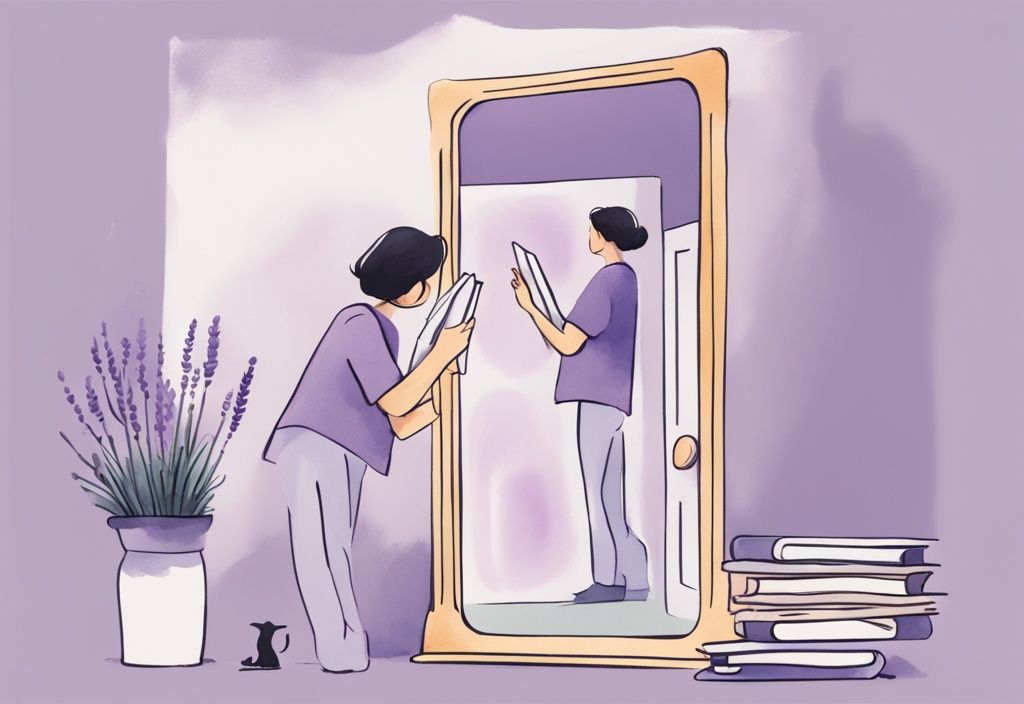Top-rated Books for Narcissists: Self-Understanding & Growth Guide
Have you ever felt bewildered within a narcissistic relationship, ensnared by the toxic dynamics? Let me, Elena Hartley, guide you on a journey to understanding and healing. This enlightening article focuses on books for narcissists, offering a launchpad for self-improvement and a soothing salve for souls seeking recovery.
Together we will explore thought-provoking reads, each providing unique insights into narcissistic behaviors and their impact. You’ll receive practical advice gleaned from these publications to help traverse the rocky terrain of narcissistic relationships, illuminating your path to a healthier, more empathetic life.
Ready to dive deep into the depths, to resurface armed with invaluable tools? Join me as we navigate these powerful books, taking the first steps towards healing and understanding.
Introduction to Narcissism and Its Impact
Narcissism intricately shapes personalities and relationships. This section delves into the dual facets of narcissism and its pervasive effects on personal connections.
Defining Narcissism
Narcissism, a multifaceted personality disorder, is predominantly characterized by an inflated sense of self-importance. Those grappling with this disorder often crave excessive attention and admiration, leading to turbulent and unstable relationships. A defining trait of narcissism is a stark deficiency in empathy toward others.
The disorder can be categorized into two distinct subtypes:
- Grandiose narcissism: This subtype is defined by overt confidence, extroversion, and a sense of entitlement. People with grandiose narcissism frequently display assertive dominance and tend to disregard others.
- Vulnerable narcissism: In contrast, vulnerable narcissism is marked by hypersensitivity, defensiveness, and low self-esteem. Individuals exhibiting this subtype may appear introverted and often grapple with feelings of shame and inadequacy.
Characteristics of Narcissistic Personality Disorder
Narcissistic Personality Disorder (NPD) involves a spectrum of characteristics typically aligned with the grandiose and vulnerable subtypes:
- Grandiose narcissism: Traits include dominance, control, entitlement, and a tendency to dismiss others.
- Vulnerable narcissism: Common traits encompass introversion, withdrawal, feelings of inadequacy, envy, and shame.
Several characteristics are shared by both subtypes:
- Manipulativeness
- Self-centeredness
- Lack of empathy
- Need for constant validation
- Superiority complex
Impact of Narcissism on Relationships
Narcissism profoundly affects relationships, often fostering emotionally manipulative behaviors such as gaslighting and psychological abuse. These behaviors create an environment of instability and emotional upheaval.
The repercussions for those entangled in relationships with narcissists are significant:
- Partners and family members might experience lowered self-esteem, heightened anxiety, and depression.
- Relationships often become one-sided and emotionally draining, leaving the affected individuals feeling exploited and undervalued.
Books for narcissists, as well as their victims, are instrumental in identifying these patterns. They offer a wealth of shared knowledge and advice that helps foster understanding and healing.
Why Books are Essential for Narcissists and Their Victims
Diving into the labyrinth of narcissism through literature can be a beacon of understanding and solace. These pages unfold the intricate patterns of narcissistic personality disorder, shedding light on what might seem like inexplicable behavior. By immersing in these narratives, recognizing and managing relationships with narcissistic individuals becomes a tangible endeavor. Books often encapsulate specific traits and behaviors, making it smoother to pinpoint narcissistic tendencies in those around us.
The Importance of Understanding Narcissism
For victims of narcissistic abuse, finding a reflection of their struggles in literature can be profoundly validating. Reading about similar experiences offers an undeniable confirmation that they are not isolated in their ordeal. This sense of validation can be a pivotal moment in emotional healing, providing much-needed clarity and context to personal battles. These books serve as a sanctuary for both victims and perpetrators, guiding them to recognize and address detrimental patterns.
Moreover, the journey to understanding narcissism isn’t just about victims. Even those who exhibit narcissistic traits can find value in these narratives. They serve as mirrors, reflecting behaviors that need confrontation and change. Through stories and research, books act as both a map and a torchlight, illuminating paths toward healthier relationships and personal growth.

How Books Aid in Healing and Recovery
Navigating relationships with narcissists requires practical and heartfelt advice, which these books generously provide. They support victims by helping them identify the subtle signs of narcissistic abuse and present concrete strategies for regaining control and self-worth. With diverse content ranging from personal anecdotes to scientific analysis, these books become comprehensive guides in the recovery process.
Consider the power of a shared story—books filled with personal accounts and expert insights offer more than just information. They weave a tapestry of understanding, brimming with practical strategies to break free from the cycle of manipulation and emotional turmoil. Through these narratives, victims learn to establish boundaries, prioritize self-care, and embark on a journey of personal empowerment.
These literary companions emphasize long-term healing, focusing on rebuilding one’s life with renewed strength. The advice they provide isn’t just theoretical—it’s actionable, geared towards helping victims reclaim their lives. From setting firm boundaries to nurturing personal growth, these books transform the daunting task of recovery into a series of manageable steps, fostering a deeply reassuring sense of empowerment.
Top Books for Narcissists’ Self-Improvement
Navigating the complex world of narcissism can be challenging. Discover books that offer profound insights into the narcissistic psyche and provide practical strategies for self-improvement.
Benefits of Self-Help Books
- Helps narcissists increase self-awareness and empathy: Self-help books push narcissists to look inward, helping them recognize and understand their behaviors and their emotional impact on others.
- Provides tools to build healthier relationships: Practical strategies offered in these books encourage more balanced and mutually respectful relationships by reducing manipulative tendencies and enhancing genuine emotional connections.
- Aids in acknowledging the impact of their behavior on others: Real-life examples and psychological insights found in these books help narcissists grasp the detrimental effects of their actions, promoting more considerate and empathetic interactions.
Popular Titles and Their Focus Areas
“Disarming the Narcissist: Surviving and Thriving with the Self-Absorbed” by Wendy T. Behary
- Focuses on understanding narcissistic behaviors and developing strategies to cope: This book delves into the psychology behind narcissistic traits, aiding individuals in comprehending why these behaviors manifest.
- Emphasizes schema therapy techniques for managing interactions: Wendy T. Behary provides practical tools to navigate and manage relationships with narcissists using schema therapy, fostering healthier and more productive interactions.
“The Narcissist You Know: Defending Yourself Against Extreme Narcissists in an All-About-Me Age” by Joseph Burgo
- Offers insights into extreme narcissistic behaviors: Joseph Burgo sheds light on the diverse and often severe manifestations of narcissism, helping readers identify these traits in people around them.
- Provides defense mechanisms for dealing with narcissists in everyday life: The book equips readers with practical strategies to protect themselves and assert their boundaries when dealing with narcissists, ensuring their emotional well-being.
Books for Narcissists’ Victims
The journey of recognizing and healing from narcissistic abuse is complex and personal. This section offers insights into the resources available, providing guidance for victims striving to understand their experiences and reclaim their emotional health.
Recognizing and Recovering from Narcissistic Abuse
Understanding narcissistic abuse is critical for anyone affected by it. This involves recognizing both overt and covert forms of abuse, which can be subtle and insidious.
- Identifying Covert and Overt Abuse: Covert narcissistic abuse can be harder to spot as it involves subtle manipulation and hidden control mechanisms, whereas overt abuse is more direct and visible. Books for narcissists’ victims focus on unveiling these hidden patterns to aid in awareness.
- Deciding to Stay or Leave: These resources often guide readers in assessing their relationships, helping them discern whether it’s healthier to continue or to leave. Such decisions can be crucial for one’s mental and emotional well-being.
- Impact on Mental Health: Narcissistic abuse often leads to significant mental health issues, including codependency, anxiety, and low self-esteem. Understanding and addressing these impacts is essential for recovery.
Key Titles and Their Contributions
“Will I Ever Be Good Enough? Healing the Daughters of Narcissistic Mothers” by Karyl McBride
This book focuses on the unique struggles faced by daughters of narcissistic mothers. These individuals often grapple with deep-rooted feelings of inadequacy and struggle with self-identity due to manipulative maternal behaviors. The book offers actionable steps to break free from these destructive patterns, helping daughters reclaim their sense of self-worth and independence.
“Psychopath Free: Recovering from Emotionally Abusive Relationships with Narcissists, Sociopaths, & Other Toxic People” by Jackson MacKenzie
Jackson MacKenzie’s work delves into the process of recovering from emotionally abusive relationships, whether with narcissists, sociopaths, or other toxic individuals. He provides readers with practical strategies and real-life stories that validate their experiences and offer a roadmap to healing. Key tools include understanding manipulation tactics, reclaiming personal power, and building healthier future relationships.
By exploring these titles, victims of narcissistic abuse can gain a deeper understanding of their experiences and find the strength and tools needed to embark on their healing journey. The focus remains on empowering victims to reclaim their lives and establish healthier, more fulfilling relationships moving forward.
Memoirs and First-Person Accounts
Memoirs offer a unique window into the lived experiences of those who navigate relationships with narcissists. By providing personal and emotional narratives, these books for narcissists and their victims reveal the hidden layers of psychological impact and abuse. They serve as both a mirror and a guide, showing the reality of life entangled with narcissistic individuals while also underscoring the journey towards healing and resilience.
Why Memoirs are Important
- Provide personal insights into living with narcissists.
- Validate the experiences of other victims.
- Highlight the emotional and psychological impact of narcissistic abuse.

Memoirs serve as a powerful tool for understanding the intricate dynamics of living with narcissists. By sharing personal stories, these books for narcissists and their victims shed light on the often hidden emotional and psychological suffering caused by narcissistic abuse. They reveal the silent struggles and complex emotions faced by those who live with narcissistic individuals.
These personal accounts not only offer solace to victims, but also provide validation and recognition. They let readers know that they are not alone in their experiences. This validation can be a crucial first step towards healing and recovery. Furthermore, these memoirs emphasize the importance of empathy and resilience, showcasing how individuals can regain control over their lives and emotions.
Notable Memoirs to Read
“I’m Glad My Mom Died” by Jennette McCurdy
- Personal account of dealing with a narcissistic mother.
- Emphasizes the journey towards healing and empowerment.
Jennette McCurdy’s memoir provides an intimate look into the challenges of growing up with a narcissistic mother. It chronicles her struggles with self-worth and the emotionally manipulative environment she was subjected to.
The book stands out for its raw honesty and vulnerability, ultimately highlighting her journey towards healing and self-empowerment. This memoir is a must-read for anyone seeking to understand the profound impact of narcissistic parenting.
“Mommie Dearest” by Christina Crawford
- Chronicles the author’s life with her narcissistic mother, Joan Crawford.
- Highlights the long-term impact of narcissistic abuse on children.
In “Mommie Dearest,” Christina Crawford offers a harrowing narrative of life with her famous, narcissistic mother, Joan Crawford. This memoir is an unflinching portrayal of the psychological torment and abuse endured during her childhood.
Christina’s storytelling uncovers the deep scars left by narcissistic parenting, providing a poignant look at the long-term effects on her mental and emotional well-being. Her story serves as a compelling testament to the strength required to overcome such adversity.
Books Offering Practical Advice and Coping Mechanisms
Strategies for Dealing with Narcissists in Various Relationships
Essentials for Navigating Relationships: Dealing with narcissists can significantly challenge romantic, familial, and professional dynamics. Understanding these challenges is critical to managing the impact on mental health and emotional well-being.
- Techniques for Recognizing Manipulative Behaviors: Awareness is the first step in handling manipulation. Books for narcissists often outline tell-tale signs like gaslighting, blame-shifting, and love-bombing.
- Countering Manipulation: Effective coping mechanisms include setting firm boundaries, practicing assertiveness, and prioritizing self-care. If you are wondering whether grandiose narcissists are dangerous, it is crucial to stay informed and take necessary precautions. Implementing these strategies helps protect one’s emotional space.
- The “No Contact” Rule: One highly recommended strategy is cutting off all communication with the narcissist. Detailed guides in literature explain how to implement “No Contact” effectively, helping victims regain control over their lives.
Books Providing Effective Coping Mechanisms
Finding the right book can be transformative. Here are some top recommendations that blend practical advice with empathetic guidance, designed to support your journey through the complexities of dealing with narcissists.
“Emotional Blackmail: When the People in Your Life Use Fear, Obligation, and Guilt to Manipulate You” by Susan Forward
Highlighting Manipulation Tactics: In this profoundly insightful read, Forward delves into how narcissists use fear, obligation, and guilt to control those around them. By exposing these tactics, the book empowers you to recognize emotional blackmail in your relationships.
Strategies for Reclaiming Personal Power: Forward offers practical advice on breaking free from manipulative behaviors. Through case studies and actionable steps, you can learn to stand up for yourself and rebuild your self-esteem.
“The Wizard of Oz and Other Narcissists” by Eleanor D. Payson
Coping with One-Way Relationships: Payson’s book sheds light on dealing with narcissists at work, in love, and within family dynamics. By understanding the one-sided nature of these relationships, you can better navigate your interactions.
Practical Advice for Managing Interactions: This book includes techniques like emotional detachment, setting clear boundaries, and managing expectations. Payson guides you through the complexities of maintaining your sanity while dealing with difficult individuals.
Books Focused on Empathy and Self-Esteem Building
Understanding the Impact of Narcissism on Self-Esteem
Engaging with narcissists often leads to significant damage to one’s self-esteem and self-worth. The aftermath of such encounters frequently leaves individuals grappling with persistent feelings of inadequacy and self-doubt. Rebuilding self-esteem post-abuse is crucial for recovery and reclaiming a sense of self-worth.
Books for narcissists and those affected by narcissistic behavior offer profound insights into these dynamics. These resources emphasize the importance of recognizing and addressing the emotional wounds inflicted by narcissistic individuals. By understanding the mechanisms of narcissistic abuse, you can begin the healing process and work towards restoring your self-esteem.
Improving Empathy and Self-Compassion
“Rethinking Narcissism” by Craig Malkin
Craig Malkin’s “Rethinking Narcissism” stands out in the realm of books for narcissists. This insightful book delves into the complexities of narcissistic behavior, guiding readers on how to identify and manage relationships with narcissistic individuals. The emphasis on developing empathy and self-compassion is crucial for both narcissists and their victims.

Malkin offers actionable strategies for recognizing narcissistic traits within oneself and others, providing a framework for fostering more compassionate and emotionally healthy interactions. The insights in this book can be transformative, making it an essential read for anyone navigating the challenges posed by narcissism.
“The Narcissism Epidemic” by Jean M. Twenge
“The Narcissism Epidemic” by Jean M. Twenge is a compelling exploration of the rise of narcissism in modern society. This book not only highlights the societal impacts of increasing narcissistic behavior but also provides methods for nurturing empathy and humility.
Twenge’s analysis is both insightful and comprehensive, making this a valuable addition to any collection of books for narcissists. By advocating for empathy and community-mindedness, the book offers a path toward mitigating the negative effects of widespread narcissism. Twenge’s work is a reminder of the importance of empathy and building a more compassionate society.
Combining Clinical Insights and Psychological Profiles
Exploring the intricacies of narcissistic personality disorder requires both scientific rigor and empathetic understanding. By blending clinical insights with psychological profiles, we can gain a holistic view of this complex condition and its multifaceted impact.
The Role of Clinical Books
Clinical books play a pivotal role in offering a comprehensive understanding of narcissistic personality disorder. These texts delve deep into the scientific and psychological analyses, unraveling the complexities of the disorder. By presenting detailed profiles and real-world case studies, they enable both professionals and laypeople to better grasp narcissistic behaviors and their profound effects on individuals and relationships.
Noteworthy Clinical Books
“Malignant Self-Love: Narcissism Revisited” by Sam Vaknin
“Malignant Self-Love: Narcissism Revisited,” authored by Sam Vaknin, stands as a cornerstone for comprehending narcissistic personality disorder. Vaknin intricately merges clinical insights with personal experiences, offering an exhaustive examination of the disorder. His work meticulously dissects the nuances of narcissism, providing readers with an in-depth perspective on its psychological foundations and manifestations.
“The Narcissistic Family: Diagnosis and Treatment” by Stephanie Donaldson-Pressman
“The Narcissistic Family: Diagnosis and Treatment” by Stephanie Donaldson-Pressman is an invaluable resource for anyone navigating narcissism within family structures. This book delivers essential guidelines for diagnosing and addressing the impacts of narcissism on family dynamics. Donaldson-Pressman highlights the critical role of therapeutic interventions, making this text a crucial asset for mental health professionals and family members alike, all aiming to understand and manage the ramifications of narcissism.
Conclusion
Summarize the Importance of Understanding and Addressing Narcissism through Literature
Understanding narcissism through literature is crucial for both narcissists and their victims. Books for narcissists offer a window into the complex nature of this personality disorder. They provide detailed explanations, real-life examples, and clinical insights that demystify narcissistic behaviors, making them more understandable and manageable.
Encourage Readers to Utilize the Mentioned Resources for Better Self-Awareness, Healing, and Recovery
The recommended books for narcissists and their victims are essential tools for self-awareness, healing, and recovery. For those grappling with narcissistic tendencies, self-help books provide guidance on increasing empathy, building healthier relationships, and understanding the impact of their behaviors. For victims, books validate their experiences, offer coping mechanisms, and provide practical advice for breaking free from manipulative behaviors.
Reinforce the Idea that While Books are Helpful, Professional Guidance is Essential for Comprehensive Treatment and Support
While books are invaluable for understanding and dealing with narcissism, they should complement, not replace, professional guidance. Approaching a mental health professional ensures comprehensive treatment and support tailored to individual needs. Together, literature and professional therapy provide a robust framework for overcoming the challenges posed by narcissism, offering a holistic approach to healing and recovery.
FAQ
What are the best books for understanding narcissism?
- “Disarming the Narcissist” by Wendy T. Behary: This gem delves into coping strategies and schema therapy, helping you manage tricky relationships with narcissists.
- “The Narcissist You Know” by Joseph Burgo: Packed with deep insights on extreme narcissists, this book offers practical defense mechanisms to navigate through challenging interactions.
How can books help victims of narcissistic abuse recover?
- Books have a magical way of validating victims’ experiences. They offer not just practical advice and recovery strategies, but also the emotional support often needed for healing from narcissistic abuse.
Are there any memoirs that provide insight into living with narcissists?
- “I’m Glad My Mom Died” by Jennette McCurdy: In this heart-wrenching memoir, McCurdy shares her journey of healing from a relationship with her narcissistic mother.
- “Mommie Dearest” by Christina Crawford: A powerful chronicle of Crawford’s experiences growing up with her narcissistic mother, the famous Joan Crawford.
What practical advice do books offer for dealing with narcissists in relationships?
- “Emotional Blackmail” by Susan Forward: This book sheds light on manipulation tactics and provides strategies to overcome emotional blackmail in relationships.
- “The Wizard of Oz and Other Narcissists” by Eleanor D. Payson: Offers practical advice tailored to managing relationships with narcissists, making it an indispensable guide.
Can reading books improve a narcissist’s empathy and self-awareness?
- Yes, books like “Rethinking Narcissism” by Craig Malkin foster empathy, self-compassion, and self-awareness in narcissists, encouraging a transformative journey.














Post Comment